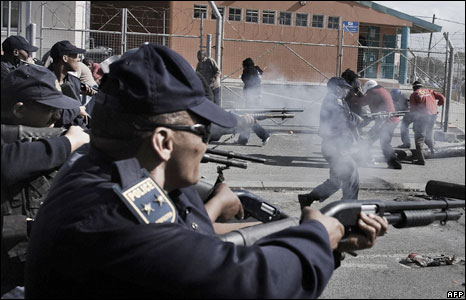
Police mainly use rubber bullets, but can fire live rounds if their lives are at risk
|
By Pumza Fihlani
BBC News, Johannesburg
|

The outrage over the shooting this week of a South African toddler has led some to question the government's new strategy to fight crime. Three-year-old Atlegang Phalane was killed when a police officer allegedly mistook a pipe the boy was carrying for a gun - he died from a single shot to the chest.
South Africa's police chief Bheki Cele did not excuse the "reckless criminal act", but did defend his call for the police to use "deadly force" when necessary. Mr Cele was appointed in July, two months after President Jacob Zuma's took office - and 11 months before the 2010 football World Cup kicks off. President Zuma said at the time that police should get tough to deal with South Africa's high levels of violent crime, but not be "trigger happy". And deputy Police Minister Fikile Mbalula has gone even further, saying: "Shoot the bastards," referring to "incorrigible criminals". But opposition parties and other rights groups say "deadly force" has caused a spike in the loss of innocent lives. Although there are no official statistics for the number of people killed by police, the South African media has highlighted three other incidents in recent weeks: - Two off-duty police officers, from Pretoria Central, said to have been "under the influence of alcohol" allegedly shot a street vendor on 1 November after he demanded they pay for sweets taken from his stall. A fight ensued and the officers reportedly shot him twice, killing him instantly.
- During an investigation on 31 October, a trainee officer allegedly shot and killed 21-year-old Kgotatso Ndobe who began running as the police approached his house outside Pretoria. His family said he had been smoking marijuana and feared he would be arrested. Mr Ndobe was killed by a single shot to the head.
- Thirty-year-old Olga Kekana was killed and her two friends injured on 11 October when police mistook a car they were travelling in for a hijacked vehicle.

There are concerns that the police are getting mixed messages
"The proximity between the recent spate of police attacks on civilians, and the police commissioner's wild talk about shooting to kill, is surely no coincidence," says Dianne Kohler Barnard of the opposition Democratic Alliance. Phillip Dexter, spokesperson of the opposition Congress of the People, agrees. "It's no use government visiting homes to pay condolences when they are the ones who made the irresponsible statements to begin with - when they are to blame," he told the BBC. The opposition Inkatha Freedom Party (IFP) said Mr Zuma's government should "admit that it made a mistake and apologise to the nation".

Bheki Cele says police have a right to use deadly force when in danger
|
Relatives of the victims have questioned the police's apparent inclination to shoot first and ask questions later - and have accused police of shooting with no provocation or warning. As the law stands, police are only allowed to use lethal force if their lives or those of innocent bystanders are in danger. They are not allowed to shoot at fleeing suspects or those suspected of having committed serious crimes, as was the case under apartheid. The government has recently proposed changes to Section 49 of the Criminal Procedure Act to allow police to use whatever means necessary to affect an arrest. The government argues that many officers' lives have been lost at the hands of criminals who don't think twice about shooting. They believe that if policemen were given more leeway to use their firearms when confronted with criminals, it would help reduce the country's crime rate and also possibly save their lives. However there are worries that the government and police bosses have not explained to officers what circumstances warrant a shoot-to-kill approach. "We are concerned that we are going to lose more lives if the 'shoot-to-kill' statement is not clarified as a matter of urgency," says the IFP's Petros Sithole. Vulnerable The Centre for the Study of Violence and Reconciliation argues the situation at the moment leaves officers unsupported. "Heated political rhetoric which encourages the reckless or unlawful use of lethal force does not serve to support police officers but rather feeds into confusing them and potentially placing them in legal jeopardy," it said a statement. The centre also notes that police officers who do use "deadly force" may find themselves on the wrong side of prison bars. The officers involved in the shootings have been arrested and are currently going through the judicial system. Police watchdog the Independent Complaints Directorate, which is handling most of these cases, has said it will "not hesitate to take action against those officers who act outside the ambit of the law". And as it stands, the government is adamant that there is no link between its call for "deadly force" and the lives that have recently been lost.
|










Bookmark with:
What are these?